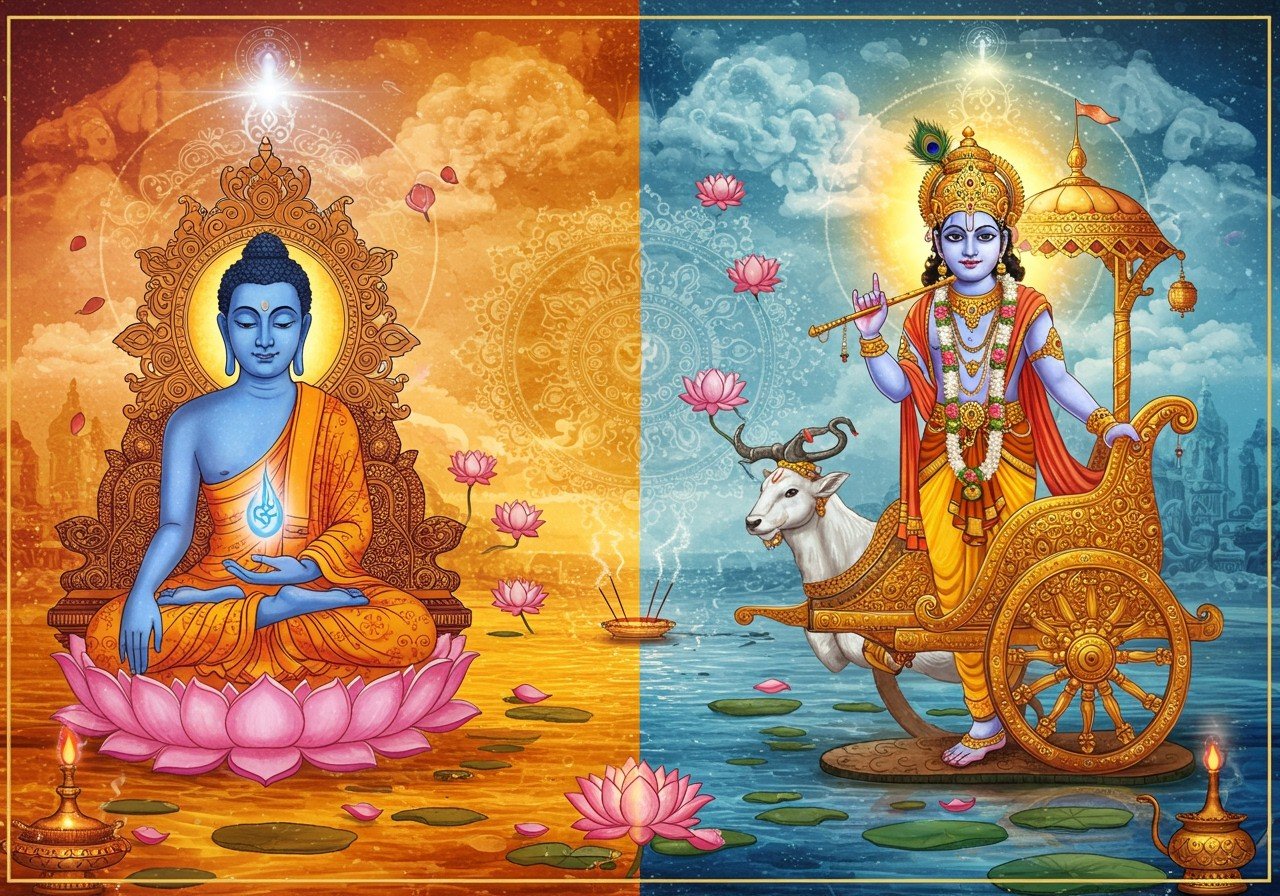
In the vibrant tapestry of Indian spirituality, two concepts stand out as guiding stars: karma and dharma. These ancient principles, deeply rooted in both Hinduism and Buddhism, offer profound wisdom for navigating the complexities of life. They shape our understanding of actions, consequences, duty, and the pursuit of liberation. Let’s explore these intertwined concepts and their significance in two of the world’s oldest religions.
Understanding Karma: The Law of Cause and Effect
Karma, often simplified as “what goes around comes around,” is more than just a cosmic payback system. It’s a fundamental law of cause and effect, woven into the fabric of existence. Every action, thought, and intention creates a ripple, influencing our present and future experiences.
Karma in Hinduism: A Cycle of Action and Rebirth
In Hinduism, karma is intricately linked to the cycle of birth, death, and rebirth (samsara). Good actions (punya) generate positive consequences, propelling us towards auspicious rebirths or ultimately, liberation (moksha). Conversely, negative actions (papa) lead to unfavorable outcomes, potentially hindering our spiritual progress. Hindu scriptures categorize karma into:
- Sanchita Karma: The storehouse of all our past actions, accumulated over countless lifetimes. Think of it as our karmic baggage.
- Prarabdha Karma: The portion of sanchita karma that is ripening in our current life, shaping our present experiences.
- Kriyamana Karma: The actions we are performing right now, creating new karmic imprints. Our present choices shape our future.
The Bhagavad Gita, a revered Hindu scripture, emphasizes performing our duties (dharma) without attachment to the fruits of our actions. This detachment helps us break free from the karmic cycle and progress towards moksha.
Karma in Buddhism: The Power of Intention
Buddhism, while sharing the concept of karma, places greater emphasis on intention (cetana). It’s not just what we do, but *why* we do it that matters. Actions rooted in wholesome intentions, like compassion and generosity, create positive karmic results. Actions driven by negative intentions, such as greed and anger, lead to suffering. Buddhism emphasizes individual responsibility for one’s karma, highlighting the importance of mindful actions and cultivating positive mental states. The goal is to purify our intentions and actions, breaking free from the cycle of suffering (samsara) and attaining Nirvana, a state of liberation.
Embracing Dharma: The Path of Righteousness
Dharma, often translated as “duty” or “righteousness,” is a multifaceted concept encompassing ethical conduct, cosmic order, and the right way of living. It provides a framework for harmonious living, both individually and within society.
Dharma in Hinduism: Living in Harmony with Cosmic Order
In Hinduism, dharma is deeply intertwined with the concept of cosmic order (rta). It guides individuals to fulfill their responsibilities based on their stage of life (ashrama), social class (varna), and individual nature (svadharma). Living in accordance with dharma maintains social harmony and upholds the universal balance. Hindu epics, like the Ramayana and Mahabharata, illustrate the importance of dharma through compelling narratives. Svadharma emphasizes personal duty.
Dharma in Buddhism: The Teachings of the Buddha
In Buddhism, dharma refers to the teachings of the Buddha and the path to enlightenment. It encompasses the Four Noble Truths, which explain the nature of suffering, and the Noble Eightfold Path, which outlines the way to liberation. Practicing dharma involves cultivating wisdom, ethical conduct, and mental discipline through meditation and mindfulness. The Sangha, the Buddhist community, provides support and guidance on this path. Buddhist dharma emphasizes individual responsibility for achieving enlightenment and emphasizes universal compassion.
Explore the profound concepts of Dharma and Karma in Hinduism in our detailed blog post.
The Interplay of Karma and Dharma: A Dance of Action and Duty
Karma and dharma are not isolated concepts; they are intricately intertwined. Dharma guides our actions, influencing our karma. By living in accordance with dharma, we naturally generate positive karma, propelling us towards spiritual growth and liberation. While interpretations may differ between Hinduism and Buddhism, both traditions emphasize the importance of aligning our actions with ethical principles to create a more harmonious and fulfilling life.
Poojn.in: Supporting Your Spiritual Journey
At Poojn.in, we understand the significance of karma and dharma in your spiritual journey. We offer a curated collection of authentic ritual items and spiritual supplies for both Buddhist and Hindu practices. Whether you seek a serene meditation space or need essential items for traditional rituals, we have you covered.
Explore our collection:
- Srimad Bhagavad Gita (Bengali Version)
- Puja Samagri
- Clay Doat for Saraswati Puja
- Pure Kalwa Off-White Raksha Sutra
Why Choose Poojn.in?
- Authenticity: We source only genuine products, ensuring the sanctity of your rituals.
- Expert Guidance: Our knowledgeable team is here to assist you in selecting the right items for your specific needs.
- Pan-India Delivery: We deliver across India, bringing the sacred to your doorstep.
Visit Poojn.in today and embark on a fulfilling spiritual journey with us. For any questions or assistance, feel free to contact our experts at 03369029784 or WhatsApp us at 9476142738.
Frequently Asked Questions about Karma and Dharma
What is the essence of karma? Karma, put simply, is the principle of cause and effect. It suggests that our actions, whether physical, mental, or verbal, have consequences. These consequences can manifest in our current life or in future lives, shaping our experiences.
How does dharma relate to karma? Dharma guides our actions, influencing the kind of karma we generate. By following our dharma, we are more likely to perform positive actions, leading to positive karmic outcomes.
Does dharma remain constant throughout life? In Hinduism, dharma can evolve based on one’s stage in life and social role. What’s considered righteous conduct for a student might differ from the duties of a householder or a renunciate. In Buddhism, dharma refers to the Buddha’s teachings, which are constant.
Can we change our karma? Both Hinduism and Buddhism affirm that we have the power to change our karmic trajectory. By making conscious choices to act ethically and cultivate positive intentions, we can create a brighter future.
Conclusion: Embracing Wisdom for a Meaningful Life
Karma and dharma, the cornerstones of Hindu and Buddhist philosophies, offer profound insights into living a life of purpose, balance, and spiritual growth. By understanding and applying these principles, we can cultivate wisdom, compassion, and navigate life’s journey with greater awareness and meaning.


